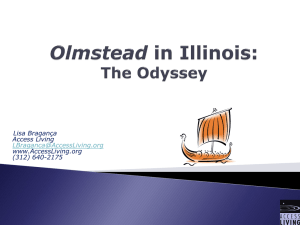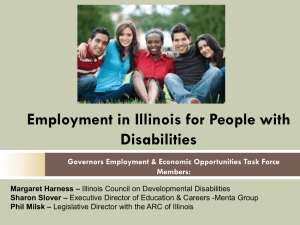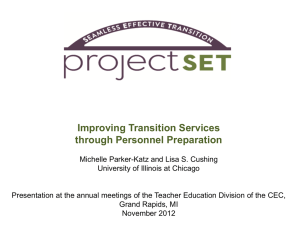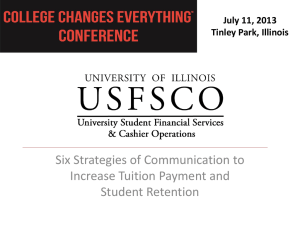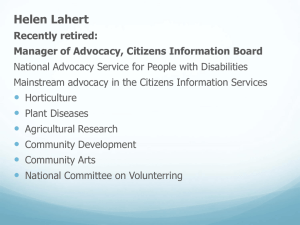Disability Rights Consortium
advertisement
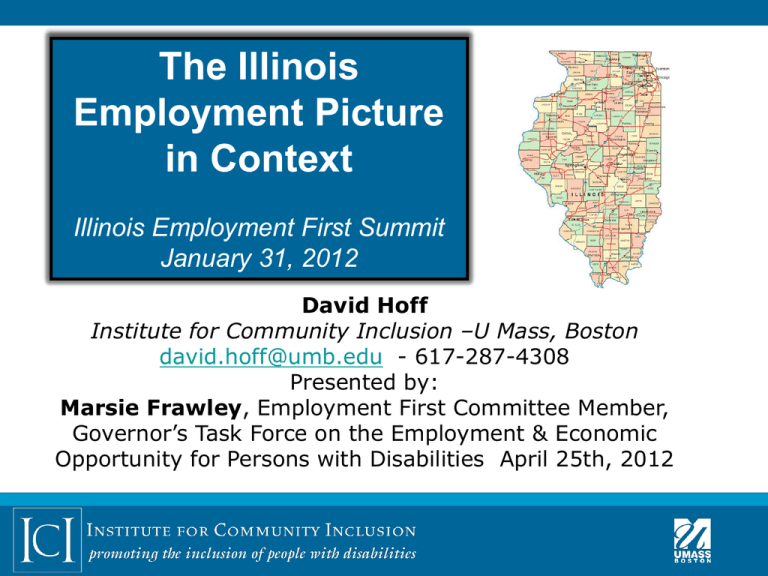
The Illinois Employment Picture in Context Illinois Employment First Summit January 31, 2012 David Hoff Institute for Community Inclusion –U Mass, Boston david.hoff@umb.edu - 617-287-4308 Presented by: Marsie Frawley, Employment First Committee Member, Governor’s Task Force on the Employment & Economic Opportunity for Persons with Disabilities April 25th, 2012 Employment First: What Is It? • General theme: Employment in the community is the first/primary service option for individuals with disabilities APSE Statement on Employment First Employment in the general workforce is the first and preferred outcome in the provision of publicly funded services for all working age citizens with disabilities, regardless of level of disability. Employment First 2012 • 30+ states have some type of “Employment First” movement About 3/4 of efforts are directed by state policy units or are legislatively based About 1/4 of efforts are grassroots based – i.e., outsiders working to influence state policy and practice • At least 15 states have official Employment First legislation and/or polices • Clear state policy: employment as first priority • Broadly focused on all aspects of system • While it may begin in the grassroots, ultimately must be adopted and implemented by the system • Primary focus is not on eliminating facility-based services "The world is full of good intentions, and I never met a nonprofit whose mission statement I didn't like. But I have not met all that many who could present some evidence of specific accomplishments that would lead in the direction of fulfilling their mission." • Norton Kiritz Founder, The Grantsmanship Center Public Policy Changes Movement to Increase Community Employment Public Policy Changes • Americans with Disabilities Act (1990) • Individuals with Disabilities Education Act (IDEA) – integration, inclusion, increased emphasis on transition and employment • Ticket to Work and Work Incentive Improvements Act (1998) • Workforce Investment Act (1998) – emphasis on disability • Olmstead Decision (1999) • Changes in RSA Regulations: successful employment outcome must be in integrated setting (2001) • CMS: New suggested Medicaid Waiver service definitions emphasizing community employment (2011) Innovations In Practice • Movement from medical model to social model • Mid 1980’s – Emergence of supported employment “Train & Place” transformed to “Place & Train” • 1990’s – Expanded use of “natural supports” • Mental health – employment as part of recovery • Ongoing innovation and expansion in use of accommodations and assistive technology • Innovations in transition practices focused on employment • Self-determination and self-direction • Changing workforce & workplace – flexible, more diverse, evolving use of technology • Universal Design 2012: Where We Are At • Individuals with even “most severe” disabilities working successfully • Disability no longer seen as insurmountable barrier to employment • Expectations are changing Individuals and families Public systems & policymakers Society Use of Work Incentives by People On SSI in Illinois • Plans for Achieving Self Support (PASS) – 40 • Impairment Related Work Expense (IRWE) – 123 • Blind Work Expense - 40 Source: Social Security Administration SSI Disabled Recipients Who Work, 2009 What We’ve Learned • Systems change must fit within overall culture of state • Systems change requires both: big picture perspective and leadership willingness to get into “nitty gritty” policy and practice details • Slow and steady wins the race • It’s not one thing, it’s a lot of things 7 Recommendations of Employment First Summit Develop the basis of an Employment First strategic plan for Illinois to include steps of: Public agency systems change and policy Data/measurement, evaluation, accountability Service and support capacity/development Funding – paying for what we want, creating incentives Transition, post-secondary education, career advancement Family and individual awareness/expectations Business and community development Next Steps in Illinois April 12th meeting of Task Force to develop annual report to the Governor Opportunity to participate in ‘Community of Practice’ with Department of Labor – Office of Disability Employment Policy – Employment First State Leadership Mentor Project Continue to build on synergy of Summit which brought strong commitment of state agencies (DRS, DDD, DMH, DCEO, ISBE, IDES, Commission on Deaf & Hard of Hearing); advocates; self-advocates; Illinois APSE; Alliance for Full Participation; and others. “Solutions to poverty are going to need to be as complicated as everything that causes it.” Dr. Claire McCarthy Martha Eliot Health Center, Boston Examples of Illinois taxpayers working towards prosperity ANDY Position: Parts inventory and other tasks at auto dealership •Customized position created at height of recession when “no one was hiring” •Position obtained via Kiwanis Club connection and shared interest in sports with manager •Now on the board of the Kiwanis Club Illinois Citizens with Disabilities – Working Towards Prosperity Laura Position: Chef - Charlie Trotters, Chicago • Graduated from IL School for Visually Impaired • Attended Chicago Lighthouse for the Blind • Received DRS assistance with vocational training at Le Cordon Bleu, College of Culinary Arts • Would like to own her own restaurant Illinois Citizens with Disabilities – Working Towards Prosperity Daniel Position: Team Member Lowe’s Home Improvement •Received transition services from DRS & partnering services through Challenges Unlimited •Has received Employee of the Month •Received DRS support in moving from group home to own apartment •National Rehabilitation Association Nominee Illinois Citizens with Disabilities – Working Towards Prosperity Jared Position: Service Clerk Jewel •Has worked for 4 years; past year without a job coach •Advocates with state legislators •Has own driver’s license – 4 year process •Now owns a MINI Cooper Illinois Citizens with Disabilities – Working Towards Prosperity ANNIE Position: Employee at After School Program • Customized position created based on interest in working with children • Started as a Snack Aide; now reads to children as part of her job • Initially required 100% job coaching; within 9 months, no job coaching Illinois Citizens with Disabilities – Working Towards Prosperity Devon Position: Mail Clerk at small hospital • Devon likes to organize; focused on potential jobs that use those skills • Customized position created through taking over mail duties previously done by nurses • Increased efficiency, boosted morale Illinois Citizens with Disabilities – Working Towards Prosperity Jennifer Position: Artist • Verbal abilities are limited, so started expressing herself through painting in elementary school. Passion for art grew from there • Art will be on display in local coffee shop in April & May • Looking for additional employment Illinois Citizens with Disabilities – Working Towards Prosperity Examples of Jennifer’s Work Web page – St. Louis Art Directory: http://myslart.ning.com/profile/JenniferWalter “ A ship in harbor is safe --but that is not what ships are built for. ” • John A. Shedd Further Information: Governor’s Task Force on the Employment and Economic Opportunities for Persons with Disabilities Co-Chairs: Robin Jones – guiness@uic.edu Ryan Croke – ryan.croke@illinois.gov Facilitator: Carlos Charneco – carlos.charneco@illinois.gov Employment First Committee Members: Robin Jones; Susan Walter swalter@isbe.net; Margaret Harknessmargaret.harkness@illinois.gov; Sharon Slover sslover@sedom.org; Phil Milskphilmilsk@aol.com; Marsie Frawley marsiefrawley@yahoo.com

